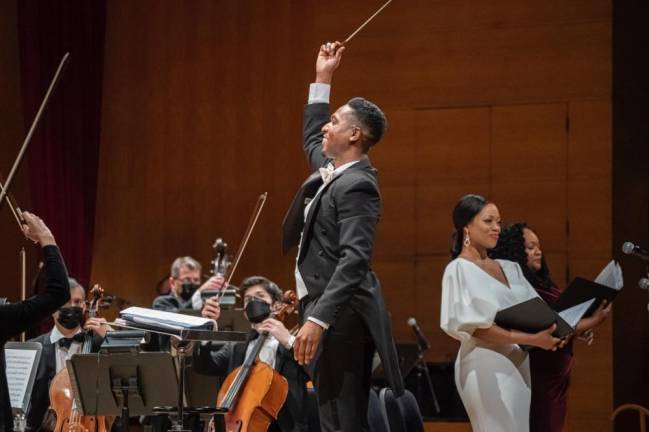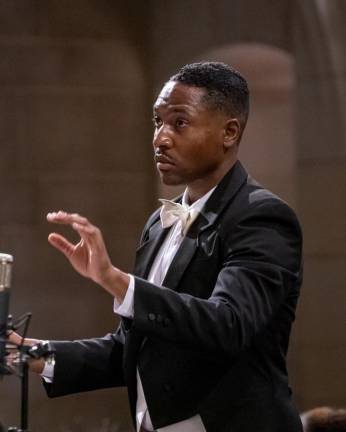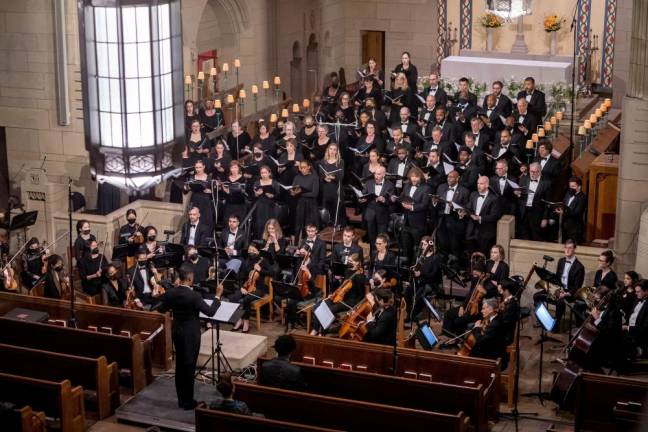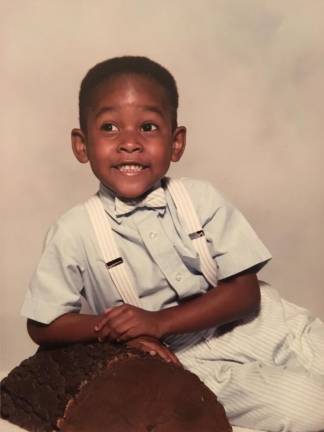Listening to His Musicians
Music director of The Dessoff Choirs, Malcolm J. Merriweather, on the art of being a conductor




When he was growing up singing in the children’s choir at St. Paul’s Cathedral in Buffalo, Malcolm J. Merriweather could have never imagined he would one day work as a musician in New York City.
The now-Harlem resident moved here in 2010 at the insistence of his voice teacher, famed dramatic coloratura soprano, Rita Shane, who sang at the Metropolitan Opera, but commuted to the Eastman School of Music in Rochester, where Merriweather earned his master’s in conducting.
In 2016, Merriweather was appointed as music director of The Dessoff Choirs, one of the most prominent amateur choruses in New York City, which was founded in 1924. Its choir members are high-level singers who come from different walks of life — some are professors, lawyers and medical students — but have a passion for vocal music. “We have a lot of people who are retired; our oldest member is in their 80s,” he said. “We have people who have been in this group for 35 and 45 years ... older than me.”
The group of 60 — which rehearses on Mondays at Union Theological Seminary in Morningside Heights — is preparing for their first concert of the year, which will be held on Nov. 5. The performance will include the North American premieres of several pieces by the first published Black composer, Vicente Lusitano, which Merriweather explained, “is a really big deal when we talk about equity and inclusion in classical music.”
This season also marks Merriweather’s first as the director of the New York Philharmonic Chorus, an ensemble of New York-based professional vocalists. He also directs the choirs at both Brooklyn College, where he also teaches conducting and performance, and the Manhattan School of Music, where he earned his doctorate — and on a weekly basis works with over 150 students.
When asked what the key to being a good conductor is, he said, “You have to listen to the musicians and inspire them ... It goes beyond the music though, increasingly I am listening to what my singers need and what’s going on with them outside of the rehearsal.”
Tell us about your first choir experience.
My first formal experiences with music were actually in the church, singing in children’s choirs. And when we moved to Buffalo, I of course sang in my elementary school choir. But there was an opportunity to sing in a professional-level children’s choir at St. Paul’s Cathedral in Buffalo, so I enrolled in that program, which is really a music education program, at that time, it was for boys. We met and rehearsed and learned music three to four times per week, so it was really intense. It was the level of structure, discipline and excellence ... We were performing with orchestras, a pipe organ, amazing musicians, so I think that was really attractive to the 9-year-old Malcolm.
When did you know you wanted to pursue music as a career?
I didn’t really know that until probably high school. There was a specific experience that I had where I was performing in a musical, it was my senior year. And I had the lead and I sang my first song. The show happened to be “South Pacific,” and I sang “Some Enchanted Evening” and it was the opening night. I was just singing, but then the audience started applauding and applauding and they kept clapping for a really long time. It was actually really awkward for me. And I remember looking down into the pit orchestra and the director just looked up at me as if to say, “Enjoy it.” And then I was like, “Oh wow, I guess I’m good at this. There’s a potential to really move people and make a difference with my artistry and singing.”
I mean I had already taken music very seriously, learning piano, singing in the choir. It was a huge commitment, but when you’re that age, you just do it. But I don’t come from a family where my parents are professional musicians or even have other musicians in my family, I’m really the only one in my family. But I cite that they were just immensely supportive throughout those formative years and remain supportive.
You have two master’s and a doctorate. Tell us about your education.
I mean I would go back and I would do it over again. I was very lucky to end up at Syracuse University. I had a wonderful scholarship there and it was the perfect conservatory experience within a larger university, so I really had a real college experience. I think large universities offer just a wealth of experiences. We went to China; I got to spend six weeks in Italy. And then I got really interested in conducting and my teachers and my professors at Syracuse really encouraged me. They just gave me opportunities to be in front of the group and direct and listen. So from there, I did a conducting degree at the Eastman School of Music and I met my voice teacher there, Rita Shane, a dramatic coloratura soprano, and we just really connected. And because of some personal circumstances, I ended up staying longer in Rochester and getting the second bachelor’s in voice.
My teacher lived in New York City, she was a really world famous opera singer and sang at the Metropolitan Opera, but she commuted and taught at Eastman. And she was like, “You have to apply for positions in the city, you’re so talented. You can conduct, you can sing.” And coming from upstate New York, I just didn’t have a reference for it, so I thought I would stay upstate. And she, at one point, made me come to New York City for an audition and I ended up getting an assistant conductorship in New York and I moved here. I’ve just been so lucky to have really incredible mentors and professors all along the way who have empowered me. As I am a teacher of performance now, I really carry that along with me.
Explain The Dessoff Choirs in your own words and where the singers come from.
Dessoff Choirs members are high-level singers, some of them majored in music or sang in their choirs in college or sang in their church choirs or sang throughout their lives. And they’re looking for an added experience with singing and vocal music, so they have their regular day jobs. We have a lot of professors in our group, many lawyers, a couple of librarians, a couple of medical students, and then we have a massage therapist.
For your first concert this year, you will be performing music from the first known published Black composer.
This composer was born in the 16th century, in 1520. He was Afro-Portuguese, so of African descent, living in Portugal, composing and writing and traveling. He was a cosmopolitan Renaissance man, actually, and he was writing this music that we typically ascribe to European school and tradition, who are all white people. And not only was he a composer, but he was an important theorist of music theory. But as we have experienced along the way, composers of color, any persons of color, are sort of erased or stricken away because of discriminatory practices. There’s a lot of scholarship surrounding what exactly happened, but we’re not getting into all of that. We’re getting into the fact that this is beautiful music and we’re performing many of these pieces for the first time in this city and this country and continent. Even when I started looking at the music, it was mind blowing, never in my training has anyone mentioned a Black composer from the Renaissance. But it’s like, “Of course, Black people were composing and doing things like this in the Renaissance, it’s just not in history.”
How long do you prepare and how many hours do you rehearse for a concert?
That’s a great question. We rehearse on Monday evenings for three hours, from 7 to 10 p.m. every Monday. We usually have about 10 to 12 rehearsals before each concert, sometimes less, rarely more, so that’s why it’s important for our group to have high-level musicians. Everyone’s really committed with regular rehearsal attendance and practicing their music outside of rehearsal.
You’re also the new director of the New York Philharmonic Chorus. How did that position come about?
Over the past three to four years, I’ve worked on several projects with the New York Philharmonic, where they have engaged me to prepare choirs for them for various concerts, to arrange music, and to talk about programming ideas, for example, for their Juneteenth celebration. And as a result of those conversations and my expertise as a choral conductor, a conversation was begun about the directorship for this New York Philharmonic Chorus and ultimately, an offer was made.